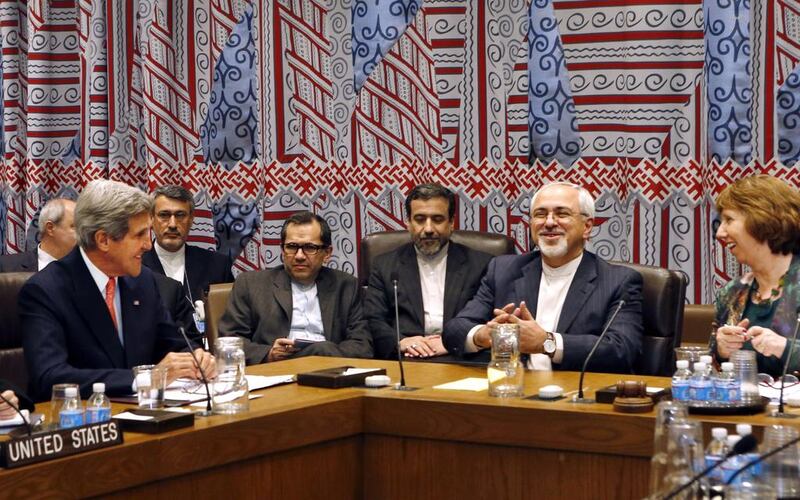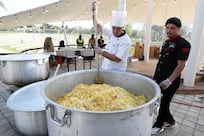Fifteen years ago another moderate Iranian president pledged to break down what he termed the “bulky wall of mistrust” with the United States.
His American counterpart, Bill Clinton was keen, but Mohammad Khatami, a hugely popular and charismatic theologian-politician, was stymied by hardliners whose power lay beyond the ballot box.
The next major opportunity for rapprochement was squandered in 2003, this time by Washington. The Iranian regime had offered the US an attractive “grand bargain” to resolve all the issues between their two countries. President George W Bush, flush with the initial success of his invasion of Iraq, did not even bother to reply.
Now sceptics and hardliners in Tehran and Washington suspect, or even hope, that the recent landmark diplomacy between their two capitals – capped by a historic phone call between presidents Hassan Rouhani and Barack Obama last Friday – is another false dawn.
Many Iran experts, however, believe there are reasons for hope that this time might well be different.
Like Mr Khatami, the new Iranian president, a genial fellow imam, has people power on his side. But unlike Mr Khatami, Mr Rouhani is a regime insider with impeccable security credentials who is trusted by the supreme leader, Ayatollah Ali Khamenei.
While the septuagenarian ayatollah is deeply suspicious of the US he has, for now at least, given Mr Rouhani the green light to explore the possibilities of a nuclear deal and even to improve ties with Washington. It is the time for “heroic flexibility”, Mr Khamenei said last month.
Seeing that Mr Rouhani currently has the supreme leader’s approval, most hardline factions in Tehran have been sullenly silent or very cautious in pushing against the president’s diplomatic outreach.
Only the ultra-hardline Kayhan daily was typically outspoken, churlishly lambasting Mr Rouhani on its front-page for taking the phone call from the American president. Most Iranians were delighted by the call, although a small group of hardliners – greatly outnumbered by well-wishers – hurled eggs and shoes at Mr Rouhani’s motorcade on his return to Tehran from New York, where he addressed the UN General Assembly.
Far more important was the unusually nuanced response from Iran’s powerful Revolutionary Guards, which Ayatollah Khamenei last month politely but pointedly advised to stay out of politics.
Ignoring that advice, the force’s commander, General Mohammad Ali Jafari, said Mr Rouhani should have “postponed” the phone call from Mr Obama until the US had taken concrete measures to prove its sincerity. The general called it a “tactical mistake”, but praised Mr Rouhani’s “strong” performance in New York, saying his speech to the UN showed the world Iran’s “flexibility, honesty and goodwill”.
Ayatollah Khamenei has yet to comment directly on Mr Rouhani’s trip to New York. But one of his most senior advisers, Ali Akbar Nategh Nouri, staunchly defended the president for taking Mr Obama’s call, and seemingly upbraided the Revolutionary Guard’s top brass for opposing it.
“Some of those who criticised [the call] do not pay attention to the point that the trip to New York was primarily to untie the knot of the problems of the people and the system,” Mr Nouri said on Monday night.
An opinion poll by Iran’s student news agency, ISNA, on Wednesday revealed that 78 per cent of Tehran’s residents saw Mr Rouhani’s New York venture as positive, with only 5.7 per cent against.
Significantly, too, Iran’s Friday prayer leaders, whose sermons are directed from the supreme leader’s office, unanimously praised the conciliatory positions taken by Mr Rouhani. One imam in Isfahan, Mohammad Taghi Rahbar, even said the ritual “death to America” chants after weekly prayers were “not verses of the Quran” and therefore could be dropped.
Moreover, some 230 of the 290 members of Iran’s conservative-dominated parliament have signed a motion praising Mr Rouhani’s “intelligent positions” during his US trip.
But, aware that this varied and vital support from hardliners might not last unless he can bring sanctions relief soon, Mr Rouhani is pressing for a deal on Iran’s nuclear programme within three to six months. He is likely to have seen Mr Jafari’s comments as a coded warning to this effect.
New negotiations on Iran’s nuclear programme between Tehran and six world powers, including the US, are to take place in Geneva on October 15.
Apart from concerns about impatient and suspicious hardliners at home, Iranian moderates have another worry: Mr Obama will be unable to deliver, despite his wishes for “a comprehensive solution” to the nuclear crisis and a new relationship between the two countries.
“I’ve heard plenty of talk in Tehran and questions about Obama and his presumed lack of backbone,” said Farideh Farhi, an Iran expert at the University of Hawaii who has been in the Iranian capital for the past month. “Many Iranians doubt he can withstand the pressure from Israel and hardliners in Congress but his phone call to Rouhani has raised hopes that he will stand his ground.”
Ali Reza Eshraghi, a former senior editor of several Iranian reformist dailies, agreed. “It appears Obama will have a more difficult time in convincing Congress to accept talks with Iran than Rouhani will in convincing Iranian hardliners,” he wrote on LobeLog, a US-based foreign affairs blog.
Scott Lucas, an Iran expert at Birmingham University in England, said: “The problem for Mr Rouhani will come if the US doesn’t appear willing to lift sanctions or recognise Iran’s right to a domestic nuclear fuel cycle.” That “will give the Revolutionary Guards traction – they will say Rouhani can’t deliver and you can’t trust the Americans.”
American hawks argue that 34 years of ice between Washington and Tehran was broken only because of the intolerable pressure of sanctions that they want intensified. That position, and Mr Obama’s assurance to Israel’s hardline premier, Benjmin Netanyahu, that the military option remains on the table, drew a sharp rebuke from Iran’s foreign minister, Mohammad Javad Zarif.
He tweeted on Tuesday: “President Obama’s presumption that Iran is negotiating because of his illegal threats and sanctions is disrespectful of a nation, macho and wrong.”
mtheodoulou@thenational.ae





